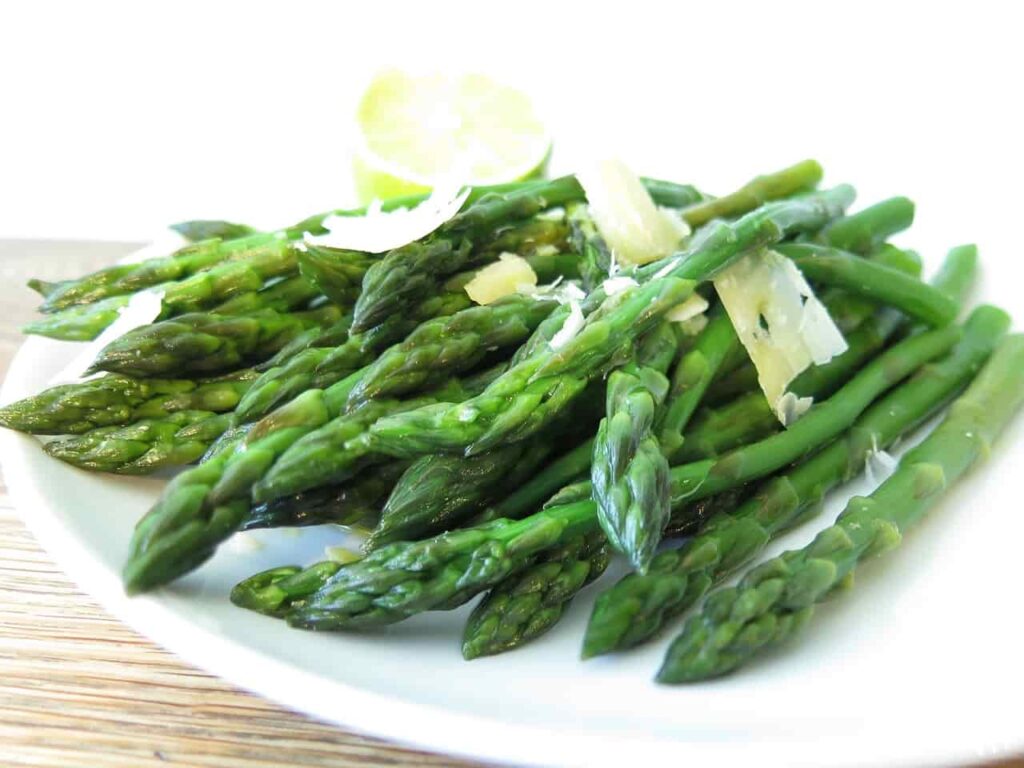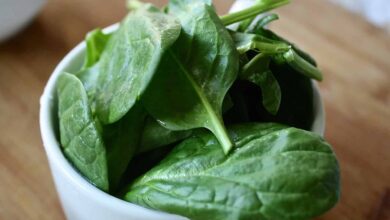Is It Safe To Eat Asparagus During Pregnancy?

Asparagus during Pregnancy can be a delightful addition to your diet. This versatile vegetable provides a burst of flavor and offers numerous health benefits. Asparagus supports the healthy development of your baby. Folate is essential during Pregnancy as it aids in forming your baby’s neural tube and helps prevent certain birth defects. So, enjoy this vibrant green veggie as part of your balanced pregnancy diet for taste and nourishment!
What is Asparagus?

Asparagus is a popular and nutritious vegetable that belongs to the lily family. It is characterized by long, thin stalks that are typically green, although there are also white and purple varieties. It can be prepared in numerous ways, including steaming, roasting, grilling, or incorporating it into salads, stir-fries, pasta dishes, and more.
Asparagus is enjoyed in many countries, including the United States, Mexico, Peru, Spain, Italy, France, China, and India. It is a popular vegetable in European cuisine, often used in dishes like steamed asparagus with hollandaise sauce, roasted asparagus, or incorporated into pasta and risotto. In Asian cuisine, asparagus is commonly stir-fried or added to soups and noodle dishes. It is also used in traditional dishes and preparations in various cultures worldwide.
Is Asparagus Good for Pregnancy?
Asparagus During Pregnancy is an excellent choice due to its many health benefits. Adding asparagus to your meals is delicious and provides valuable nutrients for a healthy pregnancy.
Benefits of Asparagus During Pregnancy

1. Rich in Folate
Asparagus is a fantastic source of folate, a crucial nutrient during Pregnancy. Folate helps develop the baby’s neural tube, which forms the brain and spinal cord.
2. Supports Baby’s Growth
The abundance of essential vitamins and minerals in asparagus promotes healthy growth and development of the baby.
3. Vitamin C Boost
Asparagus is packed with vitamin C, which aids in collagen production and supports the immune system. It also helps the body absorb iron, which is vital during Pregnancy.
4. Digestive Health
Asparagus is an excellent source of dietary fiber, which helps prevent constipation, a common issue during Pregnancy. It promotes regular bowel movements and keeps the digestive system healthy.
5. Antioxidant Power
Asparagus contains antioxidants that protect cells from damage, providing overall health benefits during Pregnancy.
6. Blood Pressure Regulation
Asparagus is a natural diuretic that helps eliminate excess bodily fluids, thereby assisting in regulating blood pressure levels.
7. Hydration Support
Asparagus has a high water content, contributing to your overall hydration during Pregnancy.
8. Iron Absorption
Asparagus contains iron and is also rich in vitamin C, which aids in iron absorption, ensuring proper red blood cell production and preventing anemia.
9. Anti-Inflammatory Properties
Asparagus possesses anti-inflammatory properties, which can help alleviate swelling and discomfort during Pregnancy.
10. Nutrient-Rich Snack
Asparagus is a low-calorie, nutrient-dense vegetable for a healthy and satisfying snack during Pregnancy.
Asparagus during Pregnancy First, Second & Third Trimester
1. First Trimester
Asparagus during Pregnancy in the first trimester can be particularly beneficial due to its high folate content. Folate is essential for the early development of the baby’s neural tube, which forms the brain and spinal cord. Adequate folate intake during this critical period helps reduce the risk of certain birth defects. Including asparagus in your diet can help ensure you get a good supply of folate.
2. Second Trimester
As the Pregnancy progresses into the second trimester, asparagus continues to provide essential nutrients. It is rich in vitamin C, which supports collagen production and aids in the growth and repair of tissues. Vitamin C also enhances iron absorption, crucial for preventing anemia and maintaining healthy blood cells for both the mother and the baby.
3. Third Trimester
In the final trimester, asparagus remains a valuable addition to the diet. It contains dietary fiber, which promotes regular bowel movements and helps prevent constipation, a common issue during Pregnancy. Thanks to its high water content, the hydration support provided by asparagus is also beneficial during this time.
Can I Eat Raw Asparagus During Pregnancy?
While cooked asparagus During Pregnancy is generally recommended, raw asparagus can also be safely consumed with a few considerations. Raw asparagus may be tougher to chew and digest than cooked asparagus, so it’s essential to thoroughly wash and clean to minimize the risk of bacterial contamination. Raw asparagus retains its natural nutrients better than cooked asparagus, providing a more concentrated dose of vitamins and minerals. It’s important to note that raw asparagus contains enzymes that can interfere with absorbing certain nutrients like vitamin B6. Cooking asparagus helps neutralize these enzymes, making the nutrients more easily available for your body to absorb.
If you eat raw asparagus during Pregnancy, ensure it comes from a trusted source, is fresh, and has been properly cleaned. Consider slicing it thinly or marinating it to enhance its texture and flavor. If you experience any digestive discomfort or find raw asparagus hard to tolerate, it may be best to opt for cooked asparagus, which is more gentle on the digestive system.
Asparagus Recipes during Pregnancy

Here are Some Asparagus Recipes Suitable For Pregnant women:
1. Roasted Asparagus with Lemon
Preheat the oven to 425°F (220°C). Trim the woody ends of asparagus spears and place them on a baking sheet. Drizzle with olive oil, sprinkle with salt and pepper, and toss to coat. Roast for about 10-12 minutes until tender but still slightly crisp. Squeeze fresh lemon juice over the roasted asparagus before serving.
2. Asparagus and Spinach Salad
Steam or blanch asparagus spears until tender-crisp. Combine the cooked asparagus with fresh baby spinach leaves, cherry tomatoes, thinly sliced red onions, and crumbled feta cheese in a large bowl. Drizzle with a dressing you choose, such as a light vinaigrette or lemon tahini dressing.
3. Grilled Asparagus Skewers
Preheat the grill to medium-high heat. Thread asparagus spears onto skewers, drizzle with olive oil, and sprinkle with salt and pepper. Grill for 5-7 minutes, occasionally turning until the asparagus is charred and tender. Serve as a side dish or add them to grilled vegetable wraps.
4. Asparagus Stir-Fry
Heat some sesame oil in a skillet or wok over medium heat. Add trimmed and cut asparagus spears and other favorite stir-fry vegetables like bell peppers, snap peas, and carrots. Stir-fry until the vegetables are crisp-tender. Season with soy sauce, ginger, and garlic for added flavor. Serve over cooked brown rice or quinoa.
5. Asparagus and Mushroom Quiche
Preheat the oven to 375°F (190°C). Line a pie crust with thinly sliced mushrooms and blanched asparagus spears. Whisk together eggs, milk, grated cheese, and seasonings in a separate bowl. Pour the mixture over the vegetables in the pie crust. Bake for about 30-35 minutes or until the quiche is set and golden brown. Allow it to cool slightly before slicing and serving.
6. Creamy Asparagus Soup
Sauté chopped onions and minced garlic in a pot with olive oil until translucent. Add trimmed and cut asparagus spears, vegetable broth, and bring to a boil. Reduce heat and let it simmer for 15-20 minutes until the asparagus is tender. Puree the mixture using an immersion blender or regular blender until smooth. Stir in a splash of heavy cream or coconut milk for creaminess. Season with salt, pepper, and a sprinkle of fresh herbs like dill or parsley.
These recipes offer a variety of ways to enjoy asparagus while pregnant, providing a nutritious and flavorful addition to your meals.
How to Cook Asparagus?

Cooking asparagus during Pregnancy is a straightforward process that can be done using various methods. Here’s a simple guide on how to cook asparagus:
1. Preparation:
- Start by selecting fresh asparagus spears. Look for firm, bright green stalks with tightly closed tips.
- Rinse the asparagus under cold water to remove any dirt or debris.
- Trim the tough ends of the asparagus by snapping them off or cutting about 1-2 inches from the bottom. The spears should naturally break where the tender part begins.
2. Boiling
- Fill a pot with water and bring it to a boil. You can add salt to the water for added flavor if desired.
- Add the asparagus to the boiling water and cook for about 3-5 minutes, or until the spears are tender but still slightly crisp. Cooking time may vary depending on the thickness of the asparagus.
- Drain the asparagus and serve immediately. You can season it with salt, pepper, or a squeeze of lemon juice.
3. Steaming
- Place a steamer basket in a pot or use a dedicated steamer.
- Add water to the pot, ensuring it doesn’t touch the bottom of the steamer basket.
- Arrange the asparagus in the steamer basket and cover the pot with a lid.
- Steam the asparagus for approximately 5-7 minutes or until it becomes tender but retains a slight crunch.
- Remove from the steamer and season with your preferred seasonings.
4. Roasting
- Preheat your oven to 425°F (220°C).
- Toss the trimmed asparagus spears with olive oil, salt, and pepper until well-coated.
- Place the asparagus in a single layer on a baking sheet.
- Roast for 10-15 minutes or until the asparagus becomes tender and slightly browned.
- Remove from the oven and serve immediately.
5. Sautéing
- Heat a skillet or frying pan over medium heat and add a drizzle of olive oil or butter.
- Add the trimmed asparagus spears to the pan and sauté for 5-7 minutes or until they become tender and slightly charred.
- Stir occasionally to ensure even cooking.
- Season with salt, pepper, or any desired herbs or spices.
Asparagus can be enjoyed as a side dish or incorporated into various recipes, such as salads, stir-fries, pasta dishes, or quiches. Feel free to experiment with different cooking methods and seasonings to suit your preferences.
Nutrition of Asparagus
Nutrition of Asparagus (per 100 grams):
| Nutrient | Amount |
|---|---|
| Calories | 20 |
| Protein | 2.2 grams |
| Carbohydrates | 3.9 grams |
| Fiber | 2.0 grams |
| Fat | 0.2 grams |
| Vitamin A | 756 IU |
| Vitamin C | 5.6 mg |
| Vitamin K | 41.6 mcg |
| Folate | 52 mcg |
| Potassium | 202 mg |
| Phosphorus | 52 mg |
| Calcium | 24 mg |
| Iron | 1.1 mg |
| Magnesium | 14 mg |
Side Effects of Asparagus During Pregnancy:
- Allergic Reactions: While rare, some individuals may have allergies to asparagus. If you experience symptoms such as itching, swelling, hives, or difficulty breathing after consuming asparagus, discontinue its consumption.
- Digestive Issues: Asparagus is high in fiber, sometimes leading to increased gas, bloating, or discomfort, particularly if you have a sensitive digestive system. If you experience these symptoms, try cooking asparagus thoroughly or adjusting your portion size to see if it alleviates the issue.
- Urine Odor: Asparagus contains sulfur compounds that, when metabolized, can produce a distinct odor in urine. This is harmless and affects some individuals more than others. It is not a cause for concern and will dissipate quickly.
- Pesticide Residue: Choosing organic or locally sourced asparagus is recommended to minimize exposure to pesticide residues. If conventional asparagus is consumed, ensure it is properly washed and cleaned to reduce potential risks.
FAQ’s
Is it safe to eat asparagus during Pregnancy?
Yes, asparagus is generally considered safe to consume during Pregnancy.
Is asparagus a good source of folate for pregnant women?
Yes, asparagus during Pregnancy is an excellent source of folate, essential for the baby’s neural tube development.
Can asparagus help with constipation during Pregnancy?
Yes, asparagus during Pregnancy is a good source of dietary fiber, which can aid in promoting healthy digestion and relieving constipation.
Can I eat raw asparagus while pregnant?
While cooked asparagus during Pregnancy is typically recommended, raw asparagus can be consumed as long as it is properly washed and cleaned.
Does asparagus have any potential side effects during Pregnancy?
Asparagus during Pregnancy is generally safe to eat, but some individuals may experience digestive issues or have allergies. Consuming it in moderation is advisable, and discontinue if any adverse reactions occur.
How should I store asparagus during Pregnancy?
To keep asparagus during Pregnancy fresh, store it in the refrigerator with the ends wrapped in a damp paper towel or upright in a container with some water.
Are there any precautions I should take when preparing asparagus?
Wash the asparagus thoroughly and trim the tough ends before cooking to remove any potential dirt or contaminants.
How can I incorporate asparagus into my pregnancy diet?
Asparagus can be a side dish in salads, stir-fries, soups, or quiches. It is versatile and can be cooked using various methods to suit your preferences.
Should I consult my healthcare provider before adding asparagus to my pregnancy diet?
It is always a good idea to consult your healthcare provider or a registered dietitian before making significant changes to your diet during Pregnancy. They can provide personalized advice based on your specific health needs and any dietary restrictions you may have.
Conclusion: Lady Well Care is a valuable source of information, providing essential knowledge for women regarding fitness, food, and nutrition. Whether you are currently expecting a baby or have experienced an abortion, it is vital to prioritize your well-being and seek guidance from healthcare professionals. By doing so, you can protect your overall health and make informed decisions.
- Please visit our Homepage for further articles on related topics.




